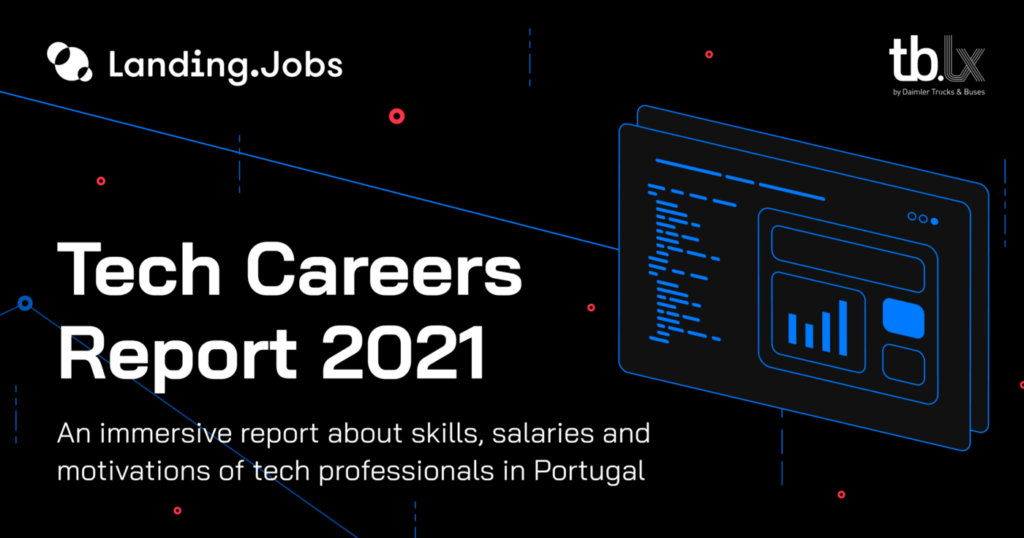
It’s that time of the year again! Yes, we are presenting you with the most insightful report of the portuguese tech careers scene. As you may know, Landing.Jobs conducts this study every year regarding the state and evolution of this market in Portugal. This is vital information for both Portuguese tech professionals and for companies hiring them, both national or international.
This year we counted on more than 4000 answers from the tech professionals community — a number that has helped us come up with really interesting insights. Sponsored by tb.lx, the Tech Careers Report 2021 aims to be a tool of progression and knowledge for the tech community, and a resource that can help drive better and more informed decisions.
We’re presenting the results and discussing even more topics like these at our upcoming online event “Top Tech Trends for 2021”, happening on the 23rd of March at 5pm WET. You can register here.
Meanwhile, you can already download the full Report for free here, and if you’re a data nerd and would like to play with the survey’s raw data to make your own analysis, you can join our Data Challenge — together with Taikai. We’re awarding 1.750€ in prizes for the most community voted analyses.
And now for some highlights:
The tech world is not just for the “chosen ones”
We’ve said this before, but we’ll say it again, this time with our own data to back us up: university is not the only way to get into the tech industry. It’s not surprising that around 19% of the respondents are self-taught — and, remember, we’re talking about tech professionals who are already in the market, actually working. Coding bootcamps are also growing like mushrooms and are a cool way to enter the field, with players like Ironhack, Le Wagon, Wild Code School, Thorly and many more to help you get started.
Remote is the future
More than a third of the respondents have a full or flexible remote job, and of the other 65% of professionals who said they had a full office job, almost 40% have adopted at least in some part a remote format due to the pandemic. Remote work is a growing tendency and it seems like full office jobs are becoming a thing of the past. Sooner than we think, we might have newer generations asking what offices were in “our time” (just kidding… but are we?).
No longer the land of the young… kind of
The tech community is starting to show signs of maturity, with over half of the professionals having more than 6 years of work experience. This is food for thought. Is the IT sector in Portugal in need of more tech talent? Studies show that IT professionals are needed pretty much everywhere, so could this mean that the turnover is not quick enough for the demand? Maybe this is a sign that reskilling is something to be taken more seriously too.
Also, only 6% of the respondents chose a contractor type of employment, while the large majority works with a permanent employee contract. However, the contracting work format is gaining some momentum compared to last year and most of the professionals who work that way are seniors (6+ years of work experience). Most of the contracting projects last between 6 months to a full year, giving the tech talent time to complete a new and cool project and move on to the next one. The salaries for this type of employment is probably why there are more interested professionals, but more on that later.
Where do most techies work?
As expected, consulting is still the most popular sector. Similarly to last year, it represents more than half of the respondents and it can mean many things. First, it suggests that companies in Portugal still oursource a lot of their IT needs, although this tendency might be changing. Second, foreign companies are increasingly using Portuguese IT service companies. And last but not least, it definitely means that foreign companies are starting to set up their own tech teams in Portugal to extend their IT capacity.
Where most techies don’t work is in the Government and Public administration sector, indicating that perhaps that area needs to bet more on technology to keep up with digitalization.
What are companies searching for?
Not surprisingly, Front-end, Back-end and Full-stack developers are the most popular tech profiles in the industry, having more than half of the representativity (and growing more popular, still). They are also the most sought after profiles by companies, so there’s definitely a lot of demand there. On the other hand, computer and network security is the least popular profile.
In terms of programming languages, Javascript is king among the others, not only in Portugal but in the rest of the world. Not far behind, SQL and HTML/CSS are also widely used stacks everywhere. Java and C#, the most traditional and considered standard languages, remain widely used as well, not only by large enterprises, but smaller ones as well.
If we’re talking frameworks, JQuery has finally been beaten by .NET in a duel of titans (not by much though), closely followed by React which is increasingly more popular. Javascript-based frameworks continue to occupy a large slice of the pie, with almost 60% of representativity.
The S word…
Salaries. Yes.
The gender gap still persists, as this year we see that men still earn, on average, 16% more than women. This number was higher last year, so not all is bad news. Hopefully this tendency to equalize pay among genders keeps growing. In terms of national regions, as expected, the metropolitan area of Lisbon offers higher salaries than in the rest of the country, by a large margin.
As we’ve said before, contractors earn more (like, 54% more) than permanent employees. This is a huuuge difference in pay that definitely makes the potential risks of working solo worth a second thought. If we go deeper into job roles, the study confirms that managerial roles are also better paid. Other areas that are also paying well are Mobile development and DevOps. On the other end of the scale, Full-stack developers have seen a decrease in the average salaries.
If you’re working remote, chances are you’re getting paid better than if you had a full office job. Our study indicates that fully remote positions are paid, on average, more 35,5% than traditional full office jobs — we told you, remote is here to stay. Also, it seems companies that have enforced office work amidst the pandemic pay worse than those who have adapted to flexible or full remote — talk about bad on bad.
In terms of company size, salaries seem to rise, on average, with the increase in number of employees, presenting a steep difference below the 20 employee mark and over the 1000 employee mark.
When it comes to programming languages, choose them wisely, especially if you’re a company. Go, Perl and Kotlin are the top 3 paying languages, while VBA and PHP linger on the opposite end of the spectrum. Other mobile development languages like Swift and Objective-C also share a good salary rank. Despite this, all of these programming languages still earn way more than the average worker in other industries, so stick to tech.
As far as job motivators go, work-life balance is the most appreciated one among tech professionals, topping career growth opportunities and even compensation and benefits. Among the IT crowd, the least valued motivators are the impact, variety and freedom to choose the projects to work on.
This year’s top perk is computer/office equipment allowance, something that has probably taken center stage due to the growing adoption of remote work, probably pushed by the pandemic reality we’ve been living.
About tb.lx
tb.lx by Daimler Trucks & Buses is a startup within the corporate based in Lisbon, Portugal and founded in 2018. With the vision to live in a world of sustainable and connected transportation, tb.lx is developing data-driven software and connectivity services for several global Daimler brands like Mercedes-Benz, Fuso or Freightliner. These new customer-centric products improve vehicle efficiency, costs and sustainability for users all around the world, such as fleet managers, drivers, operators, cities. Learn more about this industry-changing company at www.tblx.io.
Last, but not the least, this Report is a community effort. Help by sharing with your tech friends and creating more insights from the raw data for the whole tech community.
And remember, your career is our mission.
Matching You with Your Future!






0 Comments